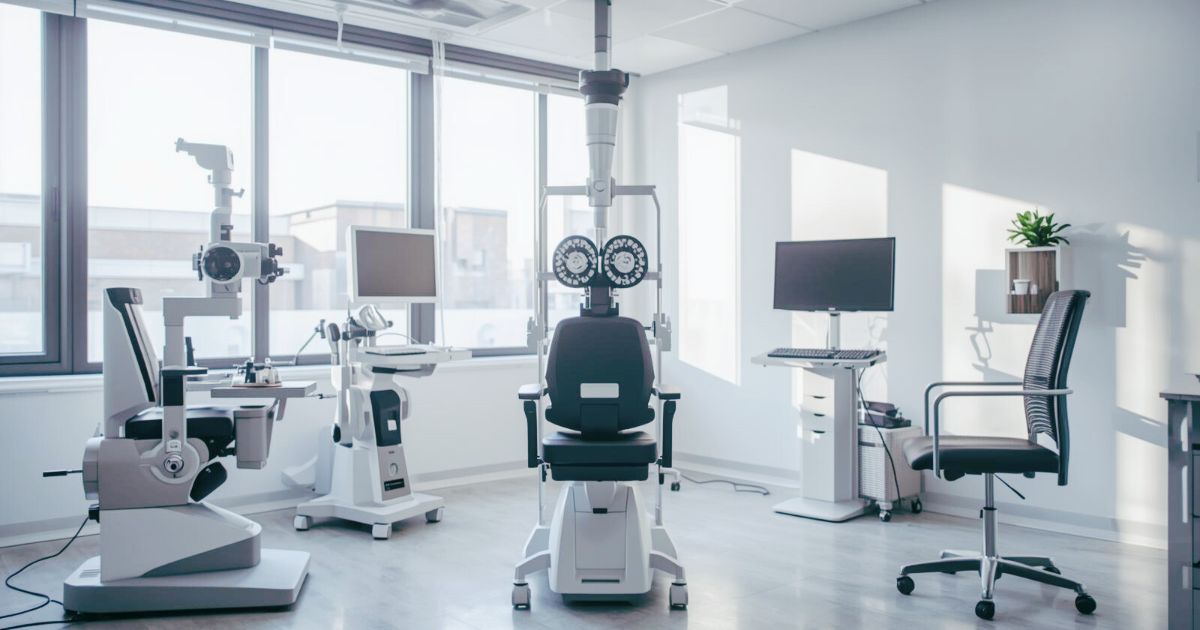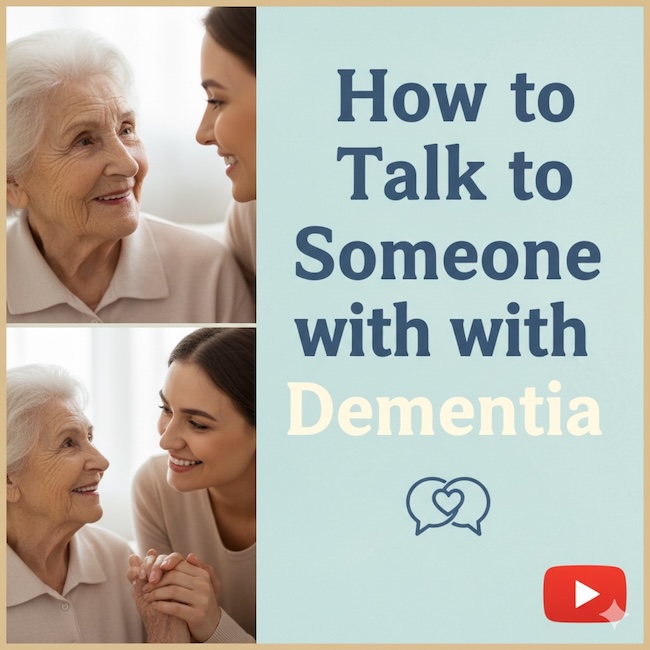There are three common changes dementia can cause to one's eyesight. They can cause confusion, frustration, or unusual behaviors in older adults, making daily life more challenging for both them and their caregivers.
In this Daily Caring piece, we explore three common eye-sight-related changes associated with dementia and the behaviors they may trigger. Understanding these challenges can help you provide better support and create a safer, more comfortable environment for your loved one.

Dementia Can Cause Vision Changes, Causing Strange Behavior
Dementia causes a range of changes in the brain, including how the eyes perceive and the brain processes visual information.
When seniors with Alzheimer’s disease or dementia behave in strange ways, we might assume they’re hallucinating.
Hallucination is a possible symptom, but changes in their vision could also explain the behavior.
However, this unusual behavior can be incredibly stressful to observe. We think the worst of an older adult’s mental state and worry that they’re declining more quickly.
Understanding vision changes helps you comprehend why your older adult may be experiencing these issues, alleviates fear and worry, and makes dementia care a little easier.
In this 2-minute video, expert dementia educator Teepa Snow explains how dementia can affect vision and the types of behaviors that may result.
VIDEO: Teepa Snow Explains Dementia and Eyesight Issues
Dementia and Eyesight: 3 Common Changes and Behaviors
1. Field of Vision Narrows
Teepa explains that by age 75, natural aging slightly reduces peripheral vision, so we notice less than we did when we were younger (17 sec in video).
When someone has dementia, their field of vision narrows to approximately 12 inches. As Teepa Snow says, it’s like wearing binoculars (33 sec in video).
If you were to use binoculars and try to move around normally, it would be tough.
2. The Dementia Brain Shuts Down Information
As dementia progresses, the brain may find that information from both eyes is too overwhelming.
So, it effectively shuts down the information coming from one eye – at that point, your older adult could be seeing through one eye (56 sec in video).
That means they lose depth perception and can’t tell if something is two-dimensional or three-dimensional.
That makes it hard for your older adult to distinguish between a pattern in the carpet or an object on the floor, a real apple or a picture of an apple, or the chair's seat height (1 min 23 sec in the video).
3. Changes in Vision Cause Confusing Behavioral Changes
These vision changes can cause someone to do things that seem strange to us.
Teepa demonstrates how someone might appear to be picking at the air, but they’re actually trying to turn off the ceiling light because it looks much closer than it actually is (1 minute 59 seconds in the video).
Because they don’t have depth perception, they don’t know how far away the light is.
An older adult might also bend over slightly and start picking at the air around waist level.
That looks strange to us, but they could be trying to pick something up from the floor. They lack depth perception and don't realize the floor is still a couple of feet away.
This type of behavior might seem strange to us, but your older adult is simply responding to the world as they see it, and it makes perfect sense to them.
If we were seeing what they were, we’d probably be doing the same things.
VIDEO: Dementia Can Lead to Vision Challenges
Home Modifications to Consider if Dementia is Causing Vision Impairments
Contrast is Your Best Friend:
Example: “Place a dark-colored chair (like navy blue or black) against a light-colored wall to make it easily visible and reduce the risk of misjudging the distance and sitting down too hard or missing it entirely.”
Example: “Use a bright red or yellow plate on a white tablecloth. This creates a strong visual boundary that helps define the plate, making it easier to see food and reducing spills.”
Example: “Paint bathroom walls a light color and install a dark-colored toilet seat. This makes the toilet starkly visible, helping to prevent accidents.”
Lighting Solutions Beyond “More Light”:
Example: “Avoid using a single, bright overhead light that creates harsh shadows and glare. Instead, use multiple, lower-level lamps around the room to create even, shadow-free illumination.”
Example: “Place a small, dim night light in the hallway and bathroom that glows a soft amber or red. These colors are less disruptive to circadian rhythms than blue-toned white light and help prevent disorientation and falls at night.”
How to Compensate for Visual Processing Deficits
Eating and Drinking:
Example: “If your loved one struggles to see a clear glass of water or milk, switch to a solid-colored cup. This makes the liquid visually ‘pop' and is much easier to see.”
Example: “Serve food on white or plain-colored plates. Avoid patterned plates, as the design can be mistaken for food or crumbs, causing confusion and anxiety.”
Grooming and Dressing:
Example: “If your loved one has trouble locating the faucet handles in the sink, put a bright-colored tape or a rubber band around them to create a high-contrast visual marker.”
Example: “Lay out clothes in the order they are put on, from top to bottom. Choose solid colors that don't clash, as difficulty with color perception (agnosia) can make patterned or clashing outfits look disturbing or confusing to them.
The Critical Link Between Vision and Hallucinations (Charles Bonnet Syndrome)
Many individuals with dementia and co-occurring vision loss experience vivid, complex visual hallucinations (seeing people, animals, or patterns that aren't there). This is often due to Charles Bonnet Syndrome (CBS), and caregivers frequently mistake it for psychosis.
It's important to know that visual hallucinations can be a direct result of sight loss, not just the dementia itself. This is known as Charles Bonnet Syndrome (CBS). The brain, lacking visual input, ‘fills in the gaps' with its own images.
If your loved one calmly reports seeing children in the garden or patterns on the wall, first reassure them by saying, ‘I understand you're seeing something, but I don't see it there. It must be confusing.'
Avoid arguing that it's not real. Instead, you can often make the hallucination disappear by changing the lighting, blinking the lights, or suggesting you both move to another room.
Conclusion
Understanding the profound connection between dementia and eyesight can fundamentally change how you interpret your loved one's behavior. What may seem like confusion or stubbornness is often a simple, understandable reaction to a world that has become visually fragmented and frightening.
By adjusting your loved one's environment with better lighting, reducing patterns, and using clear visual cues, you can help create a calmer, more navigable world for them. This knowledge is more than a caregiving tip; it's a key to reducing frustration and building a bridge of understanding, allowing you to connect with the person behind the changing perception.
Recommended for you:
About the Author

Connie is the founder of DailyCaring.com and was a hands-on caregiver for her grandmother for 20 years. (Grandma made it to 101 years old!) She knows how challenging, overwhelming, and all-consuming caring for an older adult can be. She also understands the importance of support, especially in the form of practical solutions, valuable resources, and self-care tips.














I take care of my mum .She is getting worse by the day she is very abusive and her anger is bad. I try telling my family about her behaviour but they say I must accept it . is there any way of controlling her anger
I’m so sorry this is happening and that your family isn’t being supportive. There are some techniques that you can try to help your mom feel more calm and reduce her abusive and angry behavior.
These articles share various techniques to try:
– 9 Ways to Reduce Anger in Dementia https://dailycaring.com/9-ways-to-reduce-anger-in-dementia/
– 7 Ways to Reduce and Manage Mean Dementia Behavior https://dailycaring.com/7-ways-to-respond-to-mean-dementia-behavior/
– Understanding and Managing Dementia Behaviors: A Comprehensive Guide https://dailycaring.com/understanding-and-managing-dementia-behaviors-a-comprehensive-guide/
And since your family isn’t supportive, you might also find it helpful to talk with people who understand what you’re going through. Here, we share some great private Facebook caregiver support groups – 11 Private Support Groups for Caregivers on Facebook https://dailycaring.com/support-groups-for-caregivers-on-facebook/
My mother has dementia. We’re guessing stage 4.
Her eyes have become beady and glossy. If she’s looking at you when a light is behind you. It’s reflective, like the eyes of an animal in headlights. It never used to be that way. Is this a normal side effect of dementia?
If you’re concerned that this could indicate a medical condition or medication side effect, it would be good to contact your mother’s primary doctor or her eye doctor.
Every person is unique and may experience different physical changes as their dementia progresses. If these issues are causing problems or pain, then it’s important to let a doctor know they’re happening and get appropriate treatment. If they’re not causing harm or distress and aren’t caused by a medical problem or medication side effect, it may be better to let them be.
I noticed the same thing in my aunt after her craniotomy. I wonder too if this is a sign of dementia. Or could it mean cataracts?
The best thing to do would be to share this concern with your aunt’s doctor and eye doctor so they can examine her to find the cause.
That is exactly what I saw today when I visited my sister, Does this mean that her life is nearing the end?
The only person who can diagnose issues with your sister’s health is her doctor. Something like a change in eyesight or behavior alone can’t be used to draw any meaningful conclusions.
My husband is a dementia patient with all usual symptoms and also a very bad temper towards some selected persons.As acaregiver I hardly get sleepp for more than 2 hours.He protests against keeping a helping hand.Help.
I’m so sorry this is happening. Unfortunately, this is common in dementia. Because he doesn’t have the judgement to be able to accept that he needs help, the hiring of caregivers may need to be done against his wishes. If you’re able to hire caregivers who have experience in dementia care, they are more likely to get him to cooperate and accept their help. It sounds like you definitely need and deserve the help.
We also have a number of articles that may be helpful:
— 7 Ways to Respond to Mean Dementia Behavior https://dailycaring.com/7-ways-to-respond-to-mean-dementia-behavior/
— Our section on Alzheimers & Dementia Challenging Behaviors https://dailycaring.com/tag/challenging-dementia-behaviors/
My father cannot find/see things that are right in front of him, no recognition that it’s there!?
It’s possible that this could be caused by a physical change in eyesight or by a change in the way his brain is processing what his eyes see.
Can Dementia affect hearing?
That’s a great question. There isn’t a lot of research in this area, but it makes sense that damage in the brain would affect how a person understands or processes what they hear. For example, someone with dementia could easily misunderstand something that you say to them. Or, they could have a hallucination or delusion based on a noise they heard. One thing that many experts and caregivers have found is that noisy environments can cause a lot of stress and agitation in some people with dementia — they become more sensitive to noise.
What causes dementia and why do we hear of so many more cases now than we used to do years ago?
Dementia is a broad collection of symptoms that can be caused by different health conditions. Doctors and researchers aren’t sure what causes diseases like Alzheimer’s, Lewy Body, or Frontotemporal dementia, and others, but causes for conditions like vascular dementia are better understood (https://dailycaring.com/what-is-vascular-dementia-everything-you-need-to-know/).
It’s possible that we’re only hearing of more cases of dementia now because the population is living longer than ever due to advances in healthcare. In previous generations, many people would have already died from another health condition before any dementia symptoms became noticeable. It’s also likely that because awareness of dementia was very low in the medical community (and is still not widespread), doctors would misdiagnose dementia or attribute dementia-like symptoms to “senility” and not investigate further.